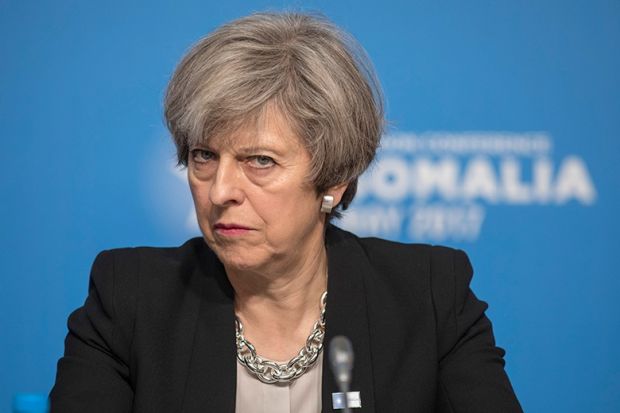Theresa May made changes to the tuition fees system the centrepiece of her morning of conference pitch, with those commitments splashed across the Sunday newspaper front pages. The context for the changes is a Conservative panic about Labour leader Jeremy Corbyn’s appeal to younger voters and the electoral impact that Labour scored with its pledge to abolish tuition fees and reintroduce maintenance grants.
There are some key implications for graduates and universities from what the government is saying (although aspects of the briefings to the national press, or the interpretation of those briefings, may be garbled).
A number of the Sunday papers refer to the government holding a “review” of fees or “commission” – an idea that seems to have been extensively briefed to them.
But some in government say that those reports are inaccurate. There will be government action on targeted areas such as the loan repayment threshold, but certainly no external review, and actually no “review” of any kind, one source tells me. May did not use the word “review” in her interview with Andrew Marr on Sunday, they point out.
Neither did Justine Greening, the education secretary, make any mention of a “review” in her speech at the Conservative Party conference today.
Yet May did tell Marr that when the £9,000 system was created, it was “expected” that universities would offer courses at fees under the maximum and provide a more diverse offering, such as through two-year degrees. “That hasn’t happened – we’ve got to look at it again,” said the prime minister.
May also refers to the absence of “differential fees” as a problem in her interview with The Daily Telegraph, as does Damian Green in his piece with The Sunday Times. Previous briefings to the national press have indicated that some in government are keen on the idea of varying universities’ fees caps according to the earnings figures for their graduates. Whether these laments and ideas will take the form of any policy is another matter.
Other elements of the government’s plans are straightforward. The loan repayment threshold will be raised from £21,000 to £25,000, which the government has briefed will save “almost a million graduates £360 a year”. George Osborne’s decision to freeze the repayment threshold (instead of raising it in line with average earnings as the government originally promised) hit low earners, as the Institute for Fiscal Studies recently highlighted in a recent influential report.
The Sunday Telegraph coverage of the “review” says that “cutting fees, slashing interest rates on debt and bringing back grants for poorer students are all being considered”. The abolition of maintenance grants and their replacement with loans, which leaves the poorest students with the highest debts, was another key problem with the current system highlighted by the IFS (and another Osborne move). So it makes sense for the government to look at maintenance grants as another area it targets for action.
In addition, May has said that the fee cap will be frozen at £9,250 and there will be no rise in line with inflation. This saves the government the embarrassment of having to vote through the inflationary rise to £9,500 that had once been planned for the 2018-19 academic year – and delivers an effective funding cut for universities. It also seems to deflate the teaching excellence framework somewhat – securing a fee rise in line with inflation being a key incentive for participating. And although linking the TEF to variable fee caps rising in line with a maximum of inflation had already been pushed away until after an independent review of the framework, that looks an even more distant prospect now.
Are we about to see the more immediate creation of a new system of varied fee caps by other means? While it seems to be an idea that appeals at least to some in No 10 and/or the Treasury, as seen in their briefings to the press, and the prime minister seems worried by the absence of differentiation, others in government reject the idea that there’s any such radical shift in policy in prospect, instead pointing to existing mechanisms to create non-price competition between universities.
Perhaps “review” is just a way of making the changes sound rather grander and more dynamic than “important tweaks to the existing system” or “important reversals of earlier Conservative mistakes” would.
Or perhaps the question of how far the status quo changes is still to be settled by tussles between different parts of government; played out, no doubt, by continued briefings to the Sunday papers that are sometimes confused and confusing.
Register to continue
Why register?
- Registration is free and only takes a moment
- Once registered, you can read 3 articles a month
- Sign up for our newsletter
Subscribe
Or subscribe for unlimited access to:
- Unlimited access to news, views, insights & reviews
- Digital editions
- Digital access to THE’s university and college rankings analysis
Already registered or a current subscriber?




